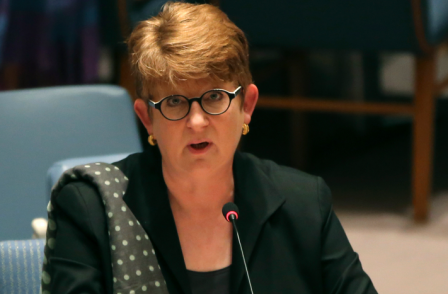
The United Nations Security Council was yesterday urged to take action over the number of journalists worldwide being murdered for doing their jobs.
Earlier this month a local newspaper editor in Russia's North Caucasus was shot dead after repeated threats. And yesterday pro Government Syrian journalist Mohammed Darrar Jammo was murdered in Lebanon.
Iraqi Ghaith Abdul-Ahad, an award-winning foreign correspondent for The Guardian newspaper was among those to address the UN. He said that there is a "sense of immunity towards all the people who kill, detain, capture journalists."
He urged the council "to recognise journalists as part of a humanitarian effort to tell a story" and said: "Many of you hate us, by the way, and I know that…It's a sign that we're doing our job properly if we've managed to piss you off. But there has to be some sort of balance. Just let us be there. Treat us as human beings. Just don't kill us."
NBC's chief foreign correspondent Richard Engel, who was kidnapped and held in Syria for five days last year, said: "We're all bloggers and punks and rebels with cameras. There is absolutely no respect for career journalists anymore."
He said that professional journalists should be given protected status, like diplomats: "just like you in the diplomatic community need protection to be objective, if you want professionals who are also objective, we need protection as well."
Somalian journalist Mustafa Hajji Abdinur, of Agence France Presse said that, like other journalists in his native country, he is "a dead man walking."
He said: "I am here today simply because I am lucky, because the gunmen that have killed so many of my colleagues, my friends, have not yet found me. In showing my face to you and the world, I increase the threat of becoming a target when I go back home."
AP executive editor Kathleen Carroll spoke about the news agency’s Wall of Honor, listing the names of the 31 journalists for the agency who have died on assignment in the last 167 years.
She said: “Most of the 31 people on our wall died covering conflict, beginning with the 1876 Battle of the Little Big Horn in the United States."
Those killed include Briton Anthony Mitchell, killed in a plane crash in Cameroon in 2007.
But Carroll noted that most journalists killed around the world each year “aren't heading off to an assignment in a treacherous spot. That dangerous assignment is the country they call home and the threat is not from war.”
She said: “Indeed, most journalists who die today are not caught in some wartime cross-fire, they are murdered just because of what they do. And those murders are rarely ever solved; the killers rarely ever punished.
“The Committee to Protect Journalists documents the attacks on journalists each year and their annual accounting is grim indeed. More than 30 journalists are murdered every year and many are abducted and tortured first.
“In the overwhelming number of cases, 90 percent, the killers go unpunished. Free to attack and kill again.
“CPJ has found that most murdered journalists, five in six, are killed in their own home towns covering local stories … usually crime and corruption.
“They are attacked by people who know their work, and often know them personally. The journalists are menaced, arrested, beaten again and again; their families or colleagues threatened.
“The attacks frequently escalate and some journalists flee their homeland for an exile’s life. Others are jailed, sometimes for years. Some disappear off the face of the earth.
“And many, too many, turn up dead. 12 in Somalia last year alone, five in Pakistan, four in Brazil, three in Syria, others in Russia, Nigeria, Cambodia, Bangladesh, Thailand, Ecuador, India and the Philippines.
“So why should the world’s leaders care about threats against journalists?
“Many officials the world over complain that journalists are headstrong and nosy. They ask questions, they write stories and take pictures that don’t always sit well with the powerful people they cover. They aim their cameras at things some people don’t want the world to see.
“Yet journalists represent the ordinary citizen … they ask questions on behalf of those people. They go to places the people cannot and bear witness. An attack on a journalist is a proxy for an attack on the people, an attack on their right to information about their communities and their institutions.
“It’s true that today, a journalist’s tools are readily available to those average citizens. They have smart phones, cameras, satellite transmissions, and many make important contributions to news coverage.
“Indeed, authenticated images and reports from deep inside Syria — some by average citizens, some by partisans — have contributed to the world’s understanding of the fighting in that country in the past two years.
“Their work enriches what we learn about the world every day, yet the threat to them can be just as great as the threat to professional journalists.
“Who will protect them?
“And who will protect the reporters and photographers and editors and radio commentators and television hosts … the men and women who swallow fear every day, who constantly calculate the risks of simply doing their job, wondering if the next breath they draw will be their last.
“The safety of journalists is not a political topic or a professional rallying cry for me. It is deeply personal. The journalists we have lost all left families behind, often very young children growing up with only the faintest memories of the parent who never came home.
“As much as I want to, I know I cannot personally protect all the AP journalists at work in every corner of the globe. But every day, I try to do it anyway.
“Because there are 31 photos on the AP Wall of Honor. And 31 pictures is enough.”
Email pged@pressgazette.co.uk to point out mistakes, provide story tips or send in a letter for publication on our "Letters Page" blog







